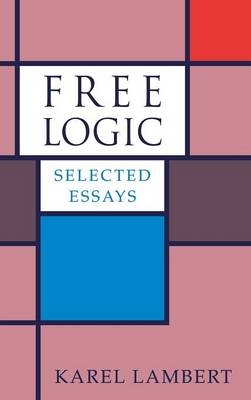
Free Logic
Selected Essays
Seiten
2002
Cambridge University Press (Verlag)
978-0-521-81816-2 (ISBN)
Cambridge University Press (Verlag)
978-0-521-81816-2 (ISBN)
Free logic is an important field of philosophical logic that first appeared in the 1950s. The author was one of its founders and coined the term itself. This collection explores the philosophical foundations of free logic and its application to areas such as the philosophy of religion and computer science.
Free logic is an important field of philosophical logic that first appeared in the 1950s. J. Karel Lambert was one of its founders and coined the term itself. The essays in this collection (written over a period of 40 years) explore the philosophical foundations of free logic and its application to areas as diverse as the philosophy of religion and computer science. Amongst the applications on offer are those to the analysis of existence statements, to definite descriptions and to partial functions. The volume contains a proof that free logics of any kind are non-extensional and then uses that proof to show that Quine's theory of predication and referential transparency must fail. The purpose of this collection is to bring an important body of work to the attention of a new generation of professional philosophers, computer scientists and mathematicians.
Free logic is an important field of philosophical logic that first appeared in the 1950s. J. Karel Lambert was one of its founders and coined the term itself. The essays in this collection (written over a period of 40 years) explore the philosophical foundations of free logic and its application to areas as diverse as the philosophy of religion and computer science. Amongst the applications on offer are those to the analysis of existence statements, to definite descriptions and to partial functions. The volume contains a proof that free logics of any kind are non-extensional and then uses that proof to show that Quine's theory of predication and referential transparency must fail. The purpose of this collection is to bring an important body of work to the attention of a new generation of professional philosophers, computer scientists and mathematicians.
Introduction; 1. Russell's version of the theory of definite descriptions; 2. Existential import, 'E!' and 'the'; 3. The reduction of two paradoxes and the significance thereof; 4. The Hilbert–Bernays theory of definite descriptions; 5. Foundations of the hierarchy of positive free definite description theories; 6. Predication and extensionality; 7. Nonextensionality; 8. The philosophical foundations of free logic; 9. Logical truth and microphysics.
| Erscheint lt. Verlag | 31.10.2002 |
|---|---|
| Verlagsort | Cambridge |
| Sprache | englisch |
| Maße | 155 x 231 mm |
| Gewicht | 470 g |
| Themenwelt | Geisteswissenschaften ► Philosophie ► Logik |
| Mathematik / Informatik ► Mathematik | |
| Naturwissenschaften | |
| ISBN-10 | 0-521-81816-8 / 0521818168 |
| ISBN-13 | 978-0-521-81816-2 / 9780521818162 |
| Zustand | Neuware |
| Informationen gemäß Produktsicherheitsverordnung (GPSR) | |
| Haben Sie eine Frage zum Produkt? |
Mehr entdecken
aus dem Bereich
aus dem Bereich
ein Gegenentwurf zum kurzfristigen Denken : so werden wir zu den …
Buch | Hardcover (2023)
REDLINE (Verlag)
CHF 27,90
Buch | Softcover (2023)
De Gruyter (Verlag)
CHF 34,90


